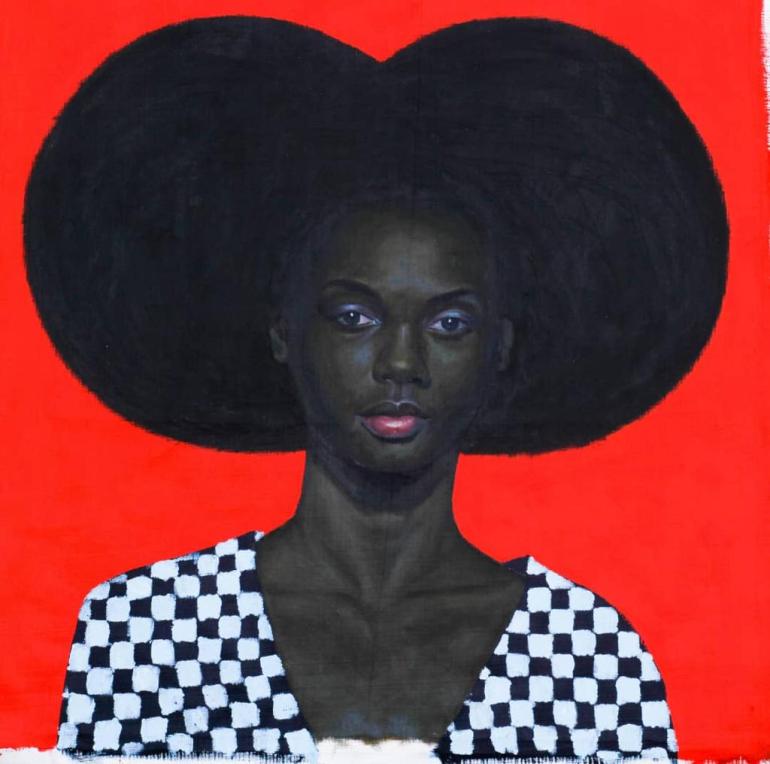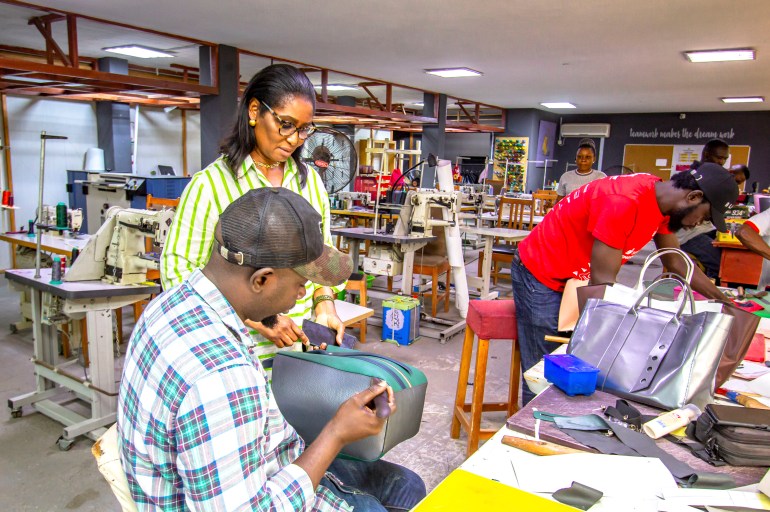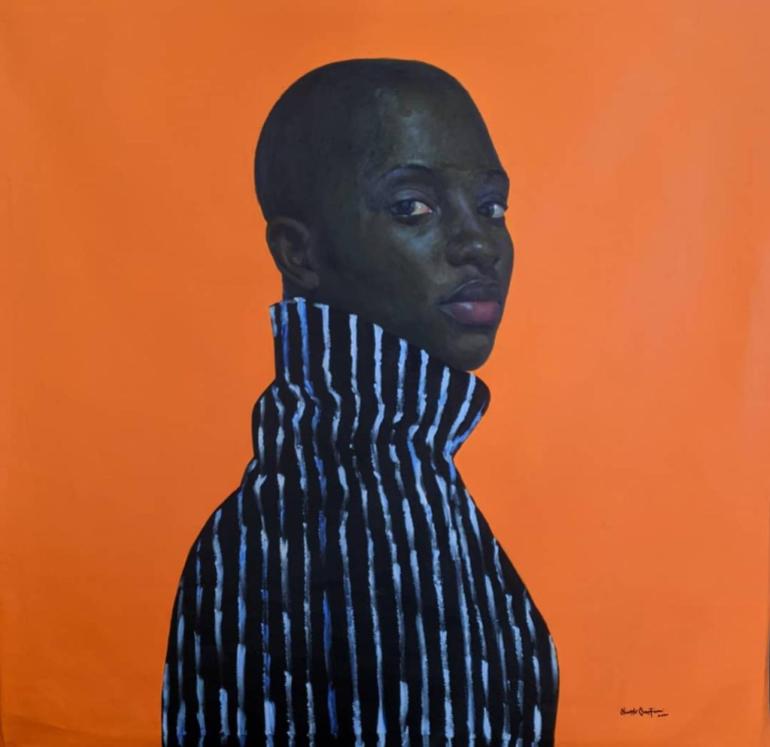‘The past glory is returning’: Ibadan’s nascent artistic revival
Oluwole Omofemi is just one of many rising artistic stars in Nigeria’s third-largest city.
![Oluwole Omofemi [Oluwafemi Amogunla/Al Jazeera]](/wp-content/uploads/2022/09/Omofemi-Oluwole_04.jpg?resize=770%2C513&quality=80)
Ibadan, Nigeria – Less than a year ago, a painting by Oluwole Omofemi hung, unguarded, at the side entrance to the grey concrete building where he maintains his two-room studio.
Just steps above one of Ibadan’s busiest thoroughfares, the young woman in the portrait had a confident stance, her face framed by a halo-like afro. She hung exposed yet unbothered by hundreds of passersby.
Keep reading
list of 3 itemsPainting in the Dark
‘Sonic Detective’: The artist using sound to expose crimes
Earlier this year, Omofemi removed the painting for safe keeping in his personal collection after similar works from his Metamorphosis series were sold for more than 100,000 euros ($96,000) in auctions at Phillips and Christie’s. In March 2022, Invader, a painting that had an estimated value of $10,000 to $15,000, sold for $189,000.
Like the painting, until recently Omofemi, 34, has been hiding in plain sight in one of Ibadan’s most active commercial centres, where he established his current studio space in 2018.
“I want to be very quiet,” Omofemi told Al Jazeera. “I want to live a normal life that an average citizen [would] live.”
He recalls a moment at a party when people were discussing Nigerian artists and the subject shifted to him.
“People were saying, ‘There’s this one guy in Ibadan. This guy has been making this, has been doing that,’ and I was just there, quiet,” he said. “A lot of these collectors don’t even know me.”

But Omofemi’s hopes of staying under the radar are dwindling.
In April, the third solo show of his career opened at Out of Africa Gallery in Barcelona, with all 10 paintings sold and a waiting list of 75 potential buyers.
Now, collectors send emissaries to find Omofemi’s Ibadan studio, hoping to entice him to sell his works directly.
In May, Tatler magazine commissioned Omofemi to paint a portrait of Queen Elizabeth II for its July issue, which celebrated her platinum jubilee, bringing his profile to new heights. It may be the last painting made of her before her death in early September.
![Oluwole Omofemi [Oluwafemi Amogunla/Al Jazeera]](/wp-content/uploads/2022/09/Omofemi-Oluwole_02.jpg?w=770&resize=770%2C513)
Omofemi’s rise is bringing more attention to his hometown of Ibadan – Nigeria’s third largest city by population, with more than 6 million people, located some 140km (85 miles) northeast of Lagos.
While Ibadan came to be eclipsed by Lagos as Nigeria’s cultural powerhouse, its legacy as an incubator for many of Nigeria’s most celebrated artists and intellectuals long precedes Omofemi, and he is just one of the many artists sparking a nascent creative revival in the city.
‘Dreams beyond money’
Founded in Ibadan in 1961, the Mbari Club, with its gallery space, library, and performance venue, was not only the artistic centre of the city but of Nigeria as a whole. Members included visual artist Bruce Onobrakpeya and young writers Wole Soyinka and Chinua Achebe. Now giants of Nigerian modern art, Uche Okeke and Demas Nwoko were both active members.
In the 1960s, Ibadan was Nigeria’s most populous city and an international destination. Malcolm X lectured at the University of Ibadan in 1964. Visual artists, including Somali modernist Ibrahim El-Salahi and the widely-acclaimed American painter Jacob Lawrence, travelled to participate in the creative exchanges at the Mbari Club.
When drummer and visual artist Tunde Odunlade moved from Ife to Ibadan in 1973, the city was still “a melting pot where the development of contemporary art [in] Nigeria took off … there was no artist from Nigeria that would not pass through Ibadan – musical, visual, dance”.
But, over almost 50 years in the city, Odunlade witnessed the shift of the country’s artistic centre from Ibadan to Lagos.
“Lagos became the commercial hub of the country, and it was easy for art to flow there,” Odunlade said.
![Tunde Odunlade [Oluwafemi Amogunla/Al Jazeera]](/wp-content/uploads/2022/09/Tunde-Odunlade_08.jpg?w=770&resize=770%2C469)
However, Odunlade and others have sought to revive Ibadan’s artistic scene in recent years.
As a well-established visual artist in his own right, he founded Tunde Odunlade Arts and Culture Connexions in Ibadan’s Bodija district in December 2020. The gallery space features a wide range of works, having displayed the works of more than 80 artists since opening.
Equally notable is that it provides a welcoming and accessible location for young cultural practitioners interested in reviving Ibadan’s artistic energy to stage events, meetings and workshops.
“The past glory of Ibadan is now returning, and I’m glad that I’m part of the whole story,” Odunlade asserts.
“I’m not surprised about what is happening in Ibadan today, especially with Oluwole Omofemi. I’m not surprised because he lives in an environment where there’s peace, where your inspiration will not just disappear because of hullabaloo around you.”

About 25 minutes’ drive away from Odunlade’s centre, luxury handbag designer Femi Olayebi’s administrative headquarters and factory occupy two full storeys in an unmarked building in central Ibadan.
During her 30-year career, Olayebi has been selected for a merchandising mentorship programme at Saks 5th Avenue, completed a fellowship at MIT, and founded the Lagos Leather Fair, all while successfully scaling up the business she founded from her home into a team of dozens of employees.
At different points in her career, Olayebi recalls wondering, “If I were in Lagos, would I have succeeded faster? Would I have succeeded earlier? At the beginning, I thought ‘yes’, but now I’m wiser, and I know that the answer is an absolute no.”
Olayebi feels “the stress of Lagos doesn’t exist in Ibadan. Ibadan affords you the ability to be creative because you’re not sitting in traffic for hours on end … And then there’s also the fact that, in Lagos, to have [the] kind of space that I have, would have cost me an absolute fortune.”
Like Olayebi, painter Modupeola Fadugba has had many successes in her career. The former Smithsonian Fellow and recent New York Emmy winner in the category of DEI Long Form Content for her short documentary, Dreams from the Deep End, has made a conscious choice to base her practice in Ibadan.
“I’ve always been someone that doesn’t quite like to be in the centre,” she explains. “But I can have access to it if and when I’m ready.”
Fadugba chose to settle in Ibadan. “It is quiet, so I can think and have a lot more space.”
![Modupeola Fadugba [Oluwafemi Amogunla/Al Jazeera]](/wp-content/uploads/2022/09/Modupeola-Fadugba_09.jpg?w=770&resize=770%2C507)
Omofemi also credits Ibadan as being integral to his development.
“I’m very sensitive to the things around me, both the visible and spiritual – very, very sensitive, and I get my inspiration from everything I see.”
While Omofemi has been influenced by Ibadan, it has been the challenges that it has presented that have propelled him to international stardom.
Omofemi’s current studio is less than 10 minutes by motorcycle from the roadside kiosk where he used to sell commissioned portraits for the equivalent of $10 to $30, a living that he was comfortable with at the time.

All of that was disrupted in 2017 when the Oyo State Government launched a city-wide campaign against street vending, forcing him from the location where he had sold his work since secondary school.
Ibadan-based painter and gallery owner Tope Fatunmbi had been encouraging Omofemi’s career since secondary school, while respected painter Ebenezer Akinola also served as an important mentor.
Although Omofemi was initially certain that his art career was over, Akinola began to introduce him and his work to established galleries.
“He took me to Lagos, and he introduced my painting to [Alexis] Gallery, and the gallery was so excited to work with me.”
He exhibited at Lagos mainstays, including Terra Kulture and Thought Pyramid, but it was Signature Gallery that saw his work as viable in the international market. They launched the opening of their London gallery with a solo show of Omofemi’s work in March 2020. The 12 large-scale portraits sold out.
Today, the intensified spotlight on his work has led to multiple offers from the world’s top auction houses to broker the sale of The Queen along with bidding wars for exclusive auction rights to his other works.
Back in Ibadan, with up to 10 young apprentices in his studio at any given time, Omofemi remains dedicated to nurturing the next generation of the city’s artistic talents.
“My thoughts, my dreams [are] beyond just having money,” he asserts.
“I spent most of my life here … I have always wanted to give back to my immediate environment in my community. I don’t want to be an artist without impact. I want to be an artist with a footprint in people’s lives.”